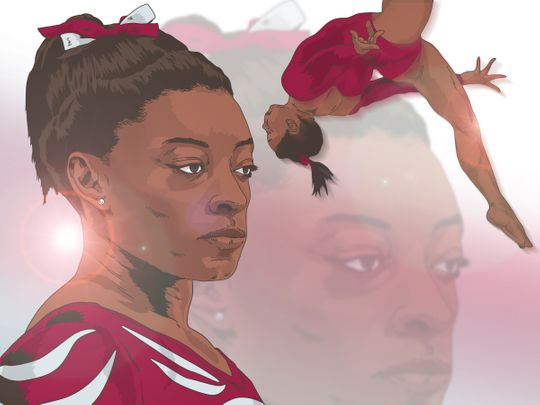
I have perfected the commando roll. I only deploy it sparingly and it has never been scored by those who judge gymnastics — but I am convinced it is worthy of full 10s.
I used it at Dubai Marina once when I stumbled on a piece of rebar steel that was left poking out of the footpath. Over I went, head over heels, only to pop up in a single movement without almost missing a beat. I don’t like to practice it, preferring to let it come naturally — not like Olympic gymnasts who must practice for hours on end every day of every week.
This year, Simone Biles became the fourth most popular sports figure in the US behind only Tom Brady, Michael Jordan and LeBron James, according to a recent survey from Morning Consult. The gymnast has been featured prominently in Olympics advertisements by NBC, which is broadcasting the games in the US.
Her sudden decision to withdraw from the individual all-around final at the Tokyo Olympics has drawn attention to the way the pandemic has exacerbated mental health issues facing the world’s top athletes.
The 24-year-old decided to drop out of the event to focus on her mental health, USA Gymnastics said in a statement, a day after she withdrew from the women’s team final, in which the US placed second.
“In the back gym, coming in today, it was like fighting all those demons,” Biles told the media, adding that pulling out was the best thing to do for Team USA.
Experts agree that athletes have been under mental duress in the past year as COVID-prevention measures meant many were isolated from important support networks while they tried to maintain peak physical ability in preparation for the Olympics. The pandemic has helped bring the issue of mental health to the fore, and likely prompted more athletes to speak out about their difficulties.
I cannot imagine what it must be like for the world’s top gymnast, Simone Biles. Uneven bars, floor, vault or beam, Biles is the best in the world.
Affected by twisties
Explaining her decision to withdraw, Biles said she had been affected by the twisties — highlighting that for all of the physical dexterity, skill, strength and grace required to compete at the very highest level of competition, mental fortitude was equally important.
It was a huge decision from the American whose passport would list her height at just 1.45m.
Aleah Finnegan, a gymnast on Team USA, posted on Twitter: “I’ve had the twisties since I was 11. I cannot imagine the fear of having it happen to you during competition. They have very limited equipment and mats in Tokyo to help something like this get fixed, let alone within a day. You have absolutely no control over your body and what it does.”
What it does, obviously, is highlight the pressure that performing places on young athletes.
For the second time in as many months, the mental health of top sports persons has once more been placed firmly into the limelight — with Naomi Osaka withdrawing from the French Open to focus on the Tokyo Olympics. The Japanese tennis player lit the Olympic flame at the opening ceremony last weekend but has also ignited a wider sentiment over athletes’ mental health.
Whether this is an old phenomenon I cannot say. I am only enough to remember Nadia Comaneci, the Romanian gymnast who, at the age of 14 at the 1976 Montreal Olympics became the first to ever score perfect 10s. Somehow, I cannot imagine Soviet-bloc coaches permitting their proletarian proteges to engage in such bourgeoisie and capitalistic decadence as “twisties”.
Intertwined mental and physical states
But this is 2021 and we are all only too aware now of how the mental and physical states are so intertwined. Every complex manoeuvre performed by Biles and every other top gymnast is done at velocity, at height, at a very fine point between control and chaos, and where the slightest error means crashing to the floor as the principles of physics impose grievous physical pain and severe injury.
Biles decision to withdraw has been fully supported by the US Olympic Committee who had previously viewed the Columbus, Ohio native as a sure bet for gold. At the 2016 in Rio, she became the first female US gymnast to win four gold medals at a single Games, and she was the first gymnast to win three consecutive world all-around titles between 2013 and 15.
Biles grew up in the Houston area of Texas after she and her sister Adria were adopted by their grandparents, Ronald and Nellie Biles. She became interested in gymnastics during a day-care field trip to Bannon’s Gymnastix. She was six at the time, and she remained there for 11 years under the direction of her coach, Aimee Boorman.
Biles won a gold in floor exercise and a bronze in vault at the Women’s Junior Olympic National Championships in 2010 before breaking into the elite level of competition in 2011. Less than two years later she dominated the sport. What set Biles apart was her consistency, her exuberant personality, and the high degree of difficulty she incorporated into her routines in uneven bars, vault, beam and floor exercises.
In Rio, she led the US to gold in the team event and became just the fifth female gymnast to claim four gold medals at a single Olympics — she only took bronze on the beam.
But Biles is also a winner when it comes to adversity. In 2018 she announced that she had been a victim of Larry Nassar, a former doctor for the US national gymnastics team who was convicted of sexually abusing numerous athletes.
It’s hard to see her competing in the 2024 given the rough and tumble of her sport. But she certainly deserves a gold medal for her bravery in highlighting what goes unseen during those performances.
— With inputs from agencies









